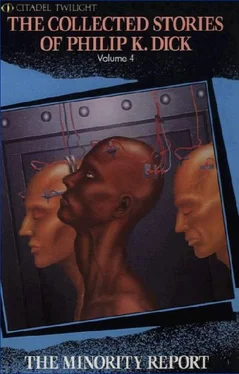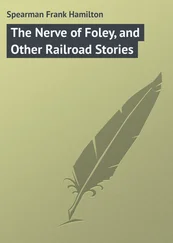“Just come.” His wife struggled to catch her breath. “A mobile car raced up, dropped it off and left. Big excitement. Golly, the factory’s a blaze of lights. You can see it for miles.”
O’Neill scanned the paper. It was a factory certification for the last group of settlement-placed orders, a total tabulation of requested and factory-analyzed needs. Stamped across the list in heavy black type were six foreboding words:
All Shipments Suspended until Further Notice
Letting out his breath harshly, O’Neill handed the paper over to Ferine. “No more consumer goods,” he said ironically, a nervous grin twitching across his face. “The network’s going on a wartime footing.”
“Then we did it?” Morrison asked haltingly.
“That’s right,” O’Neill said. Now that the conflict had been sparked, he felt a growing, frigid terror. “Pittsburgh and Detroit are in it to the finish. It’s too late for us to change our minds, now—they’re lining up allies.”
Cool morning sunlight lay across the ruined plain of black metallic ash. The ash smoldered a dull, unhealthy red; it was still warm.
“Watch your step,” O’Neill cautioned. Grabbing hold of his wife’s arm, he led her from the rusty, sagging truck, up onto the top of a pile of strewn concrete blocks, the scattered remains of a pillbox installation. Earl Ferine followed, making his way carefully, hesitantly.
Behind them, the dilapidated settlement lay spread out, a disorderly checkerboard of houses, buildings and streets. Since the autofac network had closed down its supply and maintenance, the human settlements had fallen into semibarbarism. The commodities that remained were broken and only partly usable. It had been over a year since the last mobile factory truck had appeared, loaded with food, tools, clothing and repair parts. From the flat expanse of dark concrete and metal at the foot of the mountains, nothing had emerged in their direction.
Their wish had been granted—they were cut off, detached from the network.
On their own.
Around the settlement grew ragged fields of wheat and tattered stalks of sun-baked vegetables. Crude handmade tools had been distributed, primitive artifacts hammered out with great labor by the various settlements. The settlements were linked only by horsedrawn carts and by the slow stutter of the telegraph key.
They had managed to keep their organization, though. Goods and services were exchanged on a slow, steady basis. Basic commodities were produced and distributed. The clothing that O’Neill and his wife and Earl Ferine wore was coarse and unbleached, but sturdy. And they had managed to convert a few of the trucks from gasoline to wood.
“Here we are,” O’Neill said. “We can see from here.”
“Is it worth it?” Judith asked, exhausted. Bending down, she plucked aimlessly at her shoe, trying to dig a pebble from the soft hide sole. “It’s a long way to come, to see something we’ve seen every day for thirteen months.”
“True,” O’Neill admitted, his hand briefly resting on his wife’s limp shoulder. “But this may be the last. And that’s what we want to see.”
In the gray sky above them, a swift circling dot of opaque black moved. High, remote, the dot spun and darted, following an intricate and wary course. Gradually, its gyrations moved it toward the mountains and the bleak expanse of bomb-rubbled structure sunk in their base.
“San Francisco,” O’Neill explained. “One of those long-range hawk projectiles, all the way from the West Coast.”
“And you think it’s the last?” Ferine asked.
“It’s the only one we’ve seen this month.” O’Neill seated himself and began sprinkling dried bits of tobacco into a trench of brown paper. “And we used to see hundreds.”
“Maybe they have something better,” Judith suggested. She found a smooth rock and tiredly seated herself. “Could it be?”
Her husband smiled ironically. “No. They don’t have anything better.”
The three of them were tensely silent. Above them, the circling dot of black drew closer. There was no sign of activity from the flat surface of metal and concrete; the Kansas City factory remained inert, totally unresponsive. A few billows of warm ash drifted across it and one end was partly submerged in rubble. The factory had taken numerous direct hits. Across the plain, the furrows of its subsurface tunnels lay exposed, clogged with debris and the dark, water-seeking tendrils of tough vines.
“Those damn vines,” Ferine grumbled, picking at an old sore on his unshaven chin. “They’re taking over the world.”
Here and there around the factory, the demolished ruin of a mobile extension rusted in the morning dew. Carts, trucks, search-bugs, factory representatives, weapons carriers, guns, supply trains, subsurface projectiles, indiscriminate parts of machinery mixed and fused together in shapeless piles. Some had been destroyed returning to the factory; others had been contacted as they emerged, fully loaded, heavy with equipment. The factory itself—what remained of it—seemed to have settled more deeply into the earth. Its upper surface was barely visible, almost lost in drifting ash.
In four days, there had been no known activity, no visible movement of any sort.
“It’s dead,” Ferine said. “You can see it’s dead.”
O’Neill didn’t answer. Squatting down, he made himself comfortable and prepared to wait. In his own mind, he was sure that some fragment of automation remained in the eroded factory. Time would tell. He examined his wrist-watch; it was eight thirty. In the old days, the factory would be starting its daily routine. Processions of trucks and varied mobile units would be coming to the surface, loaded with supplies, to begin their expeditions to the human settlement.
Off to the right, something stirred. He quickly turned his attention to it.
A single battered ore-gathering cart was creeping clumsily toward the factory. One last damaged mobile unit trying to complete its task. The cart was virtually empty; a few meager scraps of metal lay strewn in its hold. A scavenger… the metal was sections ripped from destroyed equipment encountered on the way. Feebly, like a blind metallic insect, the cart approached the factory. Its progress was incredibly jerky. Every now and then, it halted, bucked and quivered, and wandered aimlessly off the path.
“Control is bad,” Judith said, with a touch of horror in her voice. “The factory’s having trouble guiding it back.”
Yes, he had seen that. Around New York, the factory had lost its high-frequency transmitter completely. Its mobile units had floundered in crazy gyrations, racing in random circles, crashing against rocks and trees, sliding into gullies, overturning, finally unwinding and becoming reluctantly inanimate.
The ore cart reached the edge of the ruined plain and halted briefly. Above it, the dot of black still circled the sky. For a time, the cart remained frozen.
“The factory’s trying to decide,” Ferine said. “It needs the material, but it’s afraid of that hawk up there.”
The factory debated and nothing stirred. Then the ore cart again resumed its unsteady crawl. It left the tangle of vines and started out across the blasted open plain. Painfully, with infinite caution, it headed toward the slab of dark concrete and metal at the base of the mountains.
The hawk stopped circling.
“Get down!” O’Neill said sharply. “They’ve got those rigged with the new bombs.”
His wife and Perine crouched down beside him and the three of them peered warily at the plain and the metal insect crawling laboriously across it. In the sky, the hawk swept in a straight line until it hung directly over the cart. Then, without a sound or warning, it came down in a straight dive. Hands to her face, Judith shrieked, “I can’t watch! It’s awful! Like wild animals!”
Читать дальше












